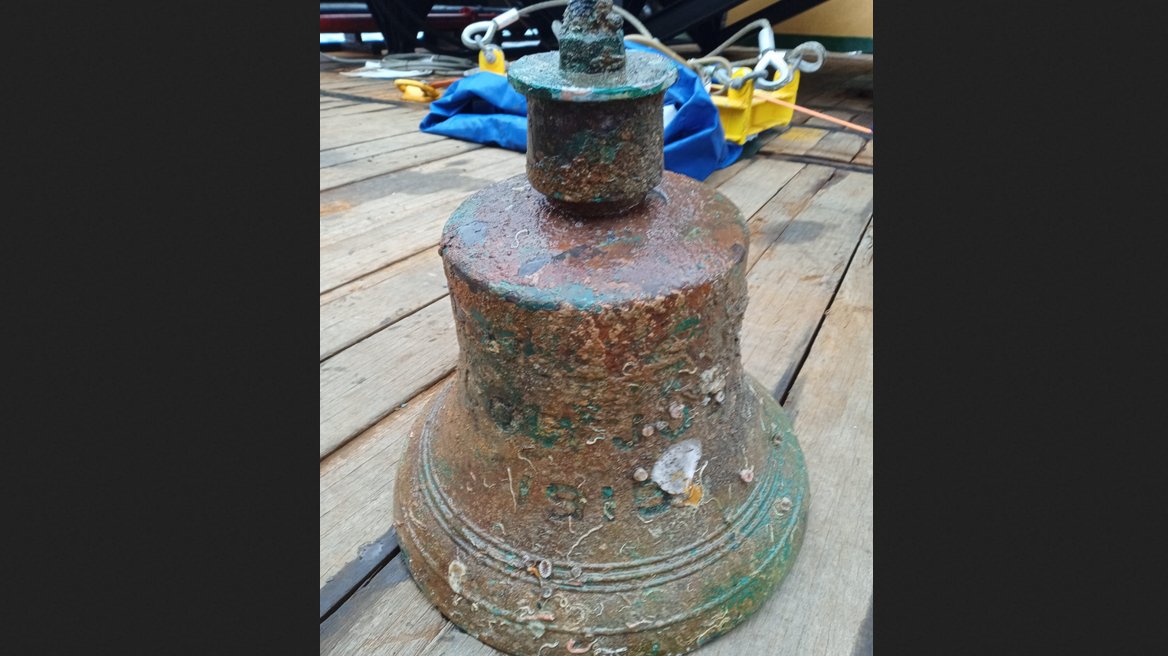

For the first time in 107 years, something from the USS Jacob Jones is above water. The ship’s bell from the first American destroyer sunk in combat was recovered and later this year will be given back to the U.S. to eventually be put on display at the National Museum of the U.S. Navy in Washington, D.C.
The USS Jacob Jones was one of several Navy destroyers fielded during World War I. Commissioned in 1916, it was sent to European waters when the United States entered the war. The ship, which had a crew of 110, spent much of its time rescuing sailors from sinking ships. However, a German U-boat targeted the destroyer on Dec. 6, 1917. While in the waters between the United Kingdom and France, the USS Jacob Jones was hit and the crew ordered to abandon ship. 64 crew members, more than half of all on board, were killed in the attack and the ship sank in under 10 minutes. It was the first American destroyer to be sunk by enemy fire.
The ship was lost for more than a century until members of the Darkstar technical diving team found the wreckage. The USS Jacob Jones was located approximately 60 miles southwest of the Isles of Scilly, at a depth of 115 meters below water. It was one of several U.S. Navy shipwrecks located in 2022. When it was found, the research team simply photographed and verified the wreck, making an effort not to disturb the remains of the ship. However the Naval History and Heritage Command grew worried about potential thefts from the wreckage site. So the NHHC contacted the British Ministry of Defense for assistance. The bell was recovered in January, by a team from the British Ministry of Defence’s Salvage and Marine Operations. The United Kingdom announced the recovery of the artifact this past week.

“The ship played an important role safeguarding convoys carrying the troops and supplies from the United States to the United Kingdom and France that were critical to Allied victory,” Sam J. Cox, director of the NHHC and a retired Navy rear admiral, said in a statement on the recovery. “The wreck of the ship is a hallowed war grave and is the last resting place for many of the 64 men who were lost in the sinking. U.S. Navy policy is to leave such wrecks undisturbed. However, due to risk of unauthorized and illegal salvaging of the ship’s bell, NHHC requested Ministry of Defence assistance. The U.S. Navy is grateful to the SALMO team for recovering the bell, which will serve as a memorial to sailors who made the ultimate sacrifice in the defense of both the United States and the United Kingdom.”
Subscribe to Task & Purpose Today. Get the latest military news and culture in your inbox daily.
The survey team documented the wreckage using a remote-operated vehicle. It also left items below the sea. The crew placed both a wreath and an American flag on the wreckage of the USS Jacob Jones. It’s unclear what will happen to the rest of the shipwreck, particularly given the concern over treasure hunters that led to this salvage mission in the first place.
Currently the recovered bell is in the custody of a private archaeology firm. It will be handed over the United States later this year and the NHHC will work on conserving it. Eventually the USS Jacob Jones’ bell will be put on display at the National Museum of the U.S. Navy.
Dominic Robinson, a member of the Darkstar team that found the USS Jacob Jones wreck, shared his own thoughts on the recovery of the bell.
“It’s great to see that the bell has been recovered and, after preservation, will be displayed in the National Museum of the U.S. Navy where it will be a permanent memorial to the brave men who lost their lives in the freezing waters of the Western Approaches in [December] 1917,” Robinson wrote in a post on Facebook.
The latest on Task & Purpose
- Army officer gets reprimand for secret camera in dressing room
- Two Army Rangers made the bracelet Taylor Swift wore at AFC Championship game
- 5 Marines who died in CH-53E helicopter crash identified
- Police find rocket from nuclear missile in Washington home
- Army orders hundreds of counter-drone Coyote munitions amid attacks on US bases
